

Plass and Lucas on Tour. J. M. Barrie. Sir James Matthew Barrie, 1st Baronet, OM (9 May 1860 – 19 June 1937) was a Scottish author and dramatist, best remembered today as the creator of Peter Pan.
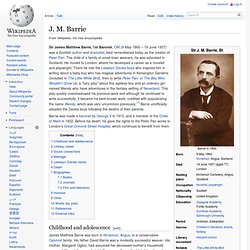
The child of a family of small-town weavers, he was educated in Scotland. He moved to London, where he developed a career as a novelist and playwright. There he met the Llewelyn Davies boys who inspired him in writing about a baby boy who has magical adventures in Kensington Gardens (included in The Little White Bird), then to write Peter Pan, or The Boy Who Wouldn't Grow Up, a "fairy play" about this ageless boy and an ordinary girl named Wendy who have adventures in the fantasy setting of Neverland. This play quickly overshadowed his previous work and although he continued to write successfully, it became his best-known work, credited with popularising the name Wendy, which was very uncommon previously.[1] Barrie unofficially adopted the Davies boys following the deaths of their parents.
Philip K. Dick. Personal life[edit] The family moved to the San Francisco Bay Area.

When Philip turned five, his father was transferred to Reno, Nevada. When Dorothy refused to move, she and Joseph divorced. Both parents fought for custody of Philip, which was awarded to the mother. Dorothy, determined to raise Philip alone, took a job in Washington, D.C., and moved there with her son. From 1948 to 1952, Dick worked at Art Music Company, a record store on Telegraph Avenue. Dick was married five times: Michael Crichton.
Cris rogers - PRACTISING RESURRECTION. Henry Vollam Morton. Henry Canova Vollam Morton FRSL (known as H.

V. Morton), (26 July 1892 – 18 June 1979) was a journalist and pioneering travel writer from Lancashire, England. He was best known for his prolific and popular books on London, Britain and the Holy Land. He first achieved fame in 1923 when, while working for the Daily Express, he scooped the official Times correspondent during the coverage of the opening of the Tomb of Tutankhamon by Howard Carter in Egypt. William Cobbett. Life[edit] Early life (1763–1791)[edit] William Cobbett's birthplace.
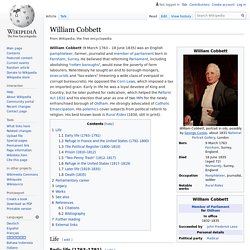
John Leland (antiquary) John Leland or Leyland (13 September, c. 1503 – 18 April 1552) was an English poet and antiquary.[2][3][4] Leland has been described as "the father of English local history and bibliography".[5] His Itinerary provided a unique source of observations and raw materials for many subsequent antiquaries, and introduced the county as the basic unit for studying the local history of England, an idea that has been influential ever since.
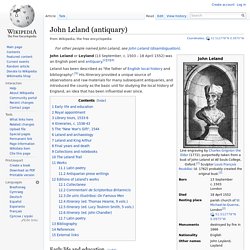
Between 1526 and 1528, Leland proceeded to Paris, studying along with many fellow expatriates, both English and German. His original plan to study in Italy, too, never succeeded.[2] Leland honed his skills at composing Latin poetry and sought the acquaintance of humanist scholars whom he much admired, such as Guillaume Budé and Jacques Lefèvre d'Étaples. By 1529, Leland had returned to England. In the 1530s and 1540s, the royal library was reorganised to accommodate hundreds of books that were previously kept in monastic collections. Gerald of Wales. William Gilpin (clergyman) William Gilpin (4 June 1724 – 1804) was an English artist, Anglican cleric, schoolmaster and author, best known as one of the originators of the idea of the picturesque.
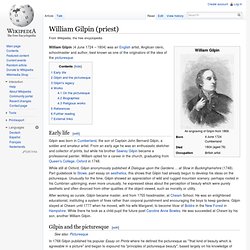
Gilpin was born in Cumberland, the son of Captain John Bernard Gilpin, a soldier and amateur artist. From an early age he was an enthusiastic sketcher and collector of prints, but while his brother Sawrey Gilpin became a professional painter, William opted for a career in the church, graduating from Queen's College, Oxford in 1748. While still at Oxford, Gilpin anonymously published A Dialogue upon the Gardens ... at Stow in Buckinghamshire (1748). Part guidebook to Stowe, part essay on aesthetics, this shows that Gilpin had already begun to develop his ideas on the picturesque. Celia Fiennes. Claimed to be "the only permanent memorial in the whole country to the memory of Celia Fiennes",[1] this "Waymark" stands in No Man's Heath, Cheshire Pioneering traveller[edit] Fiennes never married.
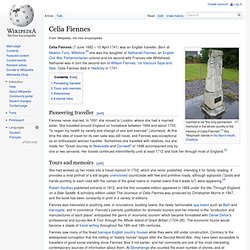
In 1691 she moved to London, where she had a married sister. Thomas Pennant. Thomas Pennant (14 June O.S. 1726 – 16 December 1798) was a Welsh naturalist, traveller, writer and antiquarian.
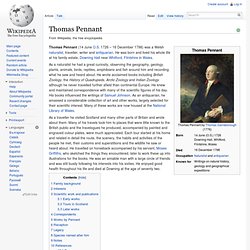
He was born and lived his whole life at his family estate, Downing Hall near Whitford, Flintshire in Wales. As a naturalist he had a great curiosity, observing the geography, geology, plants, animals, birds, reptiles, amphibians and fish around him and recording what he saw and heard about. He wrote acclaimed books including British Zoology, the History of Quadrupeds, Arctic Zoology and Indian Zoology although he never travelled further afield than continental Europe.
He knew and maintained correspondence with many of the scientific figures of his day. His books influenced the writings of Samuel Johnson. Daniel Defoe. Daniel Defoe (/ˌdænjəl dɨˈfoʊ/; c. 1660 – 24 April 1731),[1] born Daniel Foe, was an English trader, writer, journalist, pamphleteer, and spy, now most famous for his novel Robinson Crusoe.
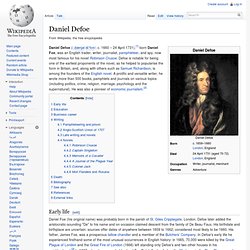
Defoe is notable for being one of the earliest proponents of the novel, as he helped to popularise the form in Britain, and, along with others such as Samuel Richardson, is among the founders of the English novel. A prolific and versatile writer, he wrote more than 500 books, pamphlets and journals on various topics (including politics, crime, religion, marriage, psychology and the supernatural). He was also a pioneer of economic journalism.[2] Early life[edit] Daniel Foe (his original name) was probably born in the parish of St. Education[edit] Business career[edit] New Testament. The Life and Work of John Keats (1795-1821) Into the Wardrobe - a C. S. Lewis web site. Roald Dahl - The Official Web Site.
Full text books free to read online in the full text archive. The Life and Work of Lord Byron (1788-1824) Radiant Lite Photography — Beginner guide to digital photography. Philipkdickfans.com - The web site devoted to science fiction visionary ... Literature.org - The Online Literature Library.